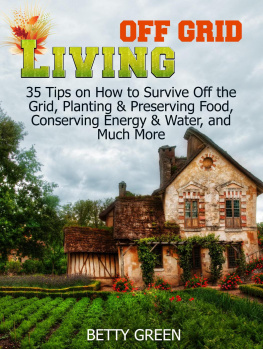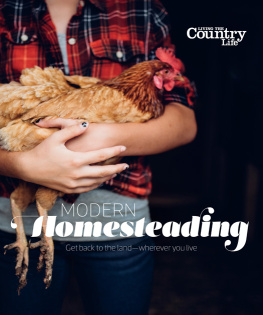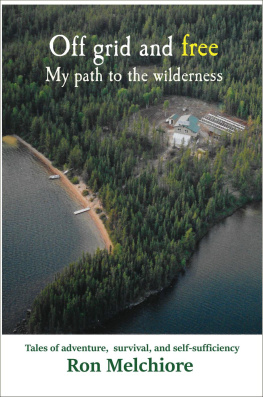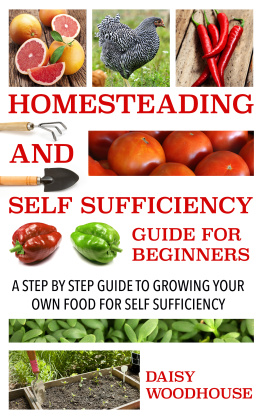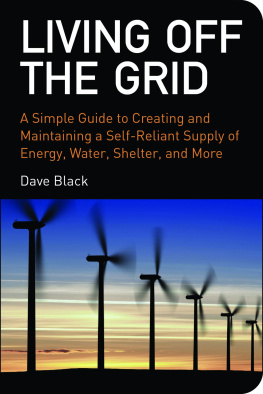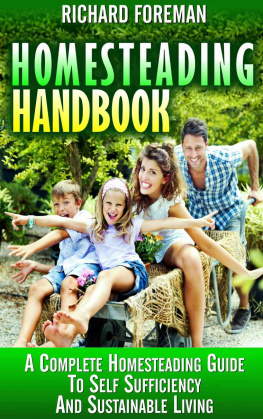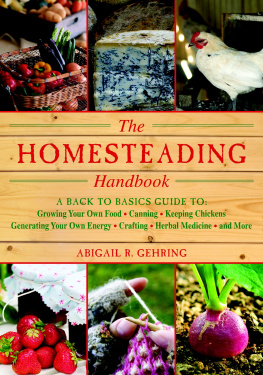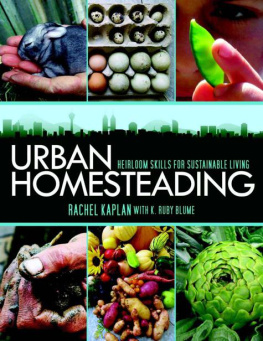Living off The Grid
A Guide on How to Live Off the Land and Become Self-Sufficient Through Homesteading
Copyright 2021
The contents of this book may not be reproduced, duplicated, or transmitted without direct written permission from the author.
Under no circumstances will any legal responsibility or blame be held against the publisher for any reparation, damages, or monetary loss due to the information herein, either directly or indirectly.
Legal Notice:
This book is copyright protected. This is only for personal use. You cannot amend, distribute, sell, use, quote or paraphrase any part or the content within this book without the consent of the author.
Disclaimer Notice:
Please note the information within this document is for educational and entertainment purposes only. Every attempt has been made to provide accurate, up to date and reliable, complete information. No warranties of any kind are expressed or implied. Readers acknowledge that the author is not engaging in the rendering of legal, financial, medical, or professional advice. The content of this book has been derived from various sources. Please consult a licensed professional before attempting any techniques outlined in this book.
By reading this document, the reader agrees that under no circumstances are the author responsible for any losses, direct or indirect, which are incurred because of the use of information within this document, including, but not limited to, errors, omissions, or inaccuracies.
Table of Contents
Introduction
What is living off the grid? Take a minute to think about your definition. Write down the things youve heard about living off the grid and keep it handy but set it aside for a moment because you will get back to your description in a few minutes.
You bought this book because it is up to date, easy to understand, and great for beginners. It contains hands-on methods and instructions to start you living off-grid or as much off-grid as you wish.
Take the time to decide what you think it means to be off-grid now; you might just get a pleasant surprise or two in these pages.
You will learn what the steps to live off-grid are.
You'll gain an understanding of what it takes, the pros and cons.
When finished reading, you will know:
What you need to get started.
How to create a homestead layout.
The style of dwelling you want.
The water and sewer choices.
How to heat and use energy.
Gardening techniques.
How to raise livestock (and why you want to start with chickens!)
Ensuring you preserve the food.
How to make money from your home.
Numerous topics go into living on a homestead and not depending on anyone else for your survival. Whether you take up hunting or live a more pacifist life by eating only vegetables and fruits, this book can make sure it happens.
Now, with the world in upheaval, hundreds of thousands of deaths from COVID-19, and potential issues of buying enough food from a supermarket, its time to learn how you can have a sustainable life off-grid. You'll even gain skills that you can make money from when you are ready to employ them.
Chapter 1: What is Living Off the Grid?
There are as many definitions of off-grid living as there are resources available online in the form of homesteading, do-it-yourself, prepping, and green living websites, each differing in the technicalities, but there's one constant in all of those definitionsits a lifestyle in which you don't rely on everyday utilities such as electricity, gas, and water.
Let's look at the definitions to get a better idea of what living like this entails.
Living off-grid is a lifestyle and system that is independent of remote infrastructures such as gas and electricity. It mentions that all off-grid houses are autonomous, as they do not depend or form on sewers, municipal water, and other utilities.
MacMillan Dictionary defines it as avoiding the commodities, including water, electricity, and gas.
Urban Dictionary (yes, I went there) states something a bit more precise describing it as Living in an unrecorded and untraceable area through regular means. If you want an example, Ron Swanson from Parks and Recreation is a good one. Urban Dictionary further jests this way of living is a term for a person who uses no form of social media. Yeah, right!
Seeing the definitions, we can theorize that living off-grid refers to a lifestyle with a house completely free from public utilities and employs sustainable living by using renewable energy.
Let's now consider all these points one by one.
Being Independent of Public Utilities
What are the public utilities you can think of off the top of your head? Municipal water, sewers, and natural gas are what we're talking about.
Being independent of municipal water means you aren't connected to the town water and have your own off-grid water system instead. We will discuss more on that later.
Being independent of sewage involves having your field bed, a septic tank, an outhouse, and a propane/composting off-grid washroom.
Last, being free of natural gas saves you a ton in terms of bills, which leaves you money you can spend on having your wood stove, firewood, and other necessities you can use to cook food and heat your house with.
If being completely self-reliant and independent sounds too good to be true, and if it gets you excited, then choosing this lifestyle can be the right choice for you. Not just yet, you must take baby steps. The first question to ask yourself is how off the grid do you want to be, and if you're a person with a family, what do they think of this? This style of living doesn't appeal to everyone.
Being Independent of Electricity
This involves you being independent of an electrical power grid, which you can accomplish by either living without electricity or by developing your systems, such as using solar power, a generator or even turbines that run on wind. That's where the term off-grid originates; the grid is the electrical network.
Levels of Living Off-Grid
The amount of self-sufficiency you want to integrate into your life is yours to decide. This means different things to different people. There are varying levels of self-sufficiency. Certain people believe that you aren't following this way of life if you still must rely on propane and diesel as fuel for your generator or for heating your house. But others believe that they are merely by installing solar panels in their house in the suburbs. The latter can even sell their generated power to the local network.
Are You Still Off-Grid if You're Still Using Fuel?
Yes. As a hypothetical, let's consider that you're living in a cabin in the woods, heated by firewood, have an outhouse for toiletry, and have your water source. That counts as off the grid. You can use solar power and wind power to generate electricity, in which case you won't be using diesel, oil, or propane. That's considered being completely off-grid, but if you use fuel, that's you being off-grid only to a certain degree . Remember, we talked about varying degrees of this lifestyle. The definition is up to you to produce.
Using Solar Power Isn't the Criteria
Technically, if you have a house in the suburbs and are using solar power as your primary source of electricity, you're still connected to the electrical grid. So, doesn't that beat the purpose of living off-grid? In most American states and Canadian provinces, you have the option of selling your solar power, a process that's known as net metering.


